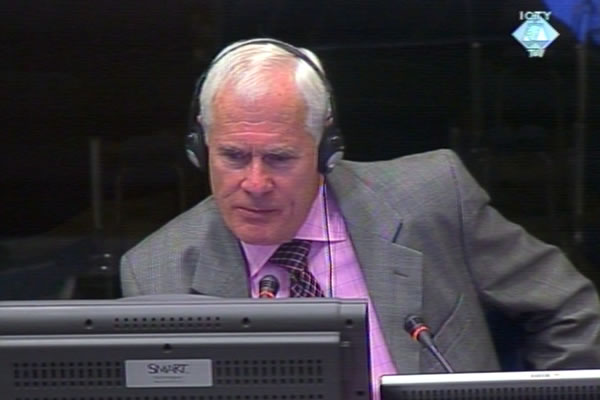Home
SECRET COMMITTEE, SECRET ALLIANCE AND SECRET ARMY
In his cross-examination of Colm Doyl, Radovan Karadzic tried to prove that the Bosnian Muslims were the first to get arms and caused the conflicts with the Serbs, claiming that in early 1991, Izetbegovic first set up a secret committee for the defense of the Muslims, and later that year, made a ‘secret war alliance’ against Yugoslavia and the JNA with Kucan and Tudjman, and that by 1992, he had ‘a secret army’ of more than 120,000 armed troops
 Colm Doyle, witness at the Radovan Karadzic trial
Colm Doyle, witness at the Radovan Karadzic trial In his cross-examination of Irish colonel Colm Doyl, former Republika Srpska president Radovan Karadzic tried to refute the witness’s claim that Serbs didn’t want to live with Muslims in the same state and that they wanted to create ‘an ethnically cleansed territory’ through a campaign of ‘violence and intimidation’ conducted with the assistance of the JNA. There was no room in that state for other ethnic communities, the witness had claimed.
‘It was not our position that we could not live with Muslims, but that we could not live under Muslims’, Karadzic said. Serbs had been ‘under Muslims’ on the eve of the war, Karadzic contended, as evidenced by the fact that the ‘Muslim side’ had for a year ‘sabotaged the appointment of Serbs to the posts in the police that belonged to them’. According to Karadzic, “Muslim side” was also responsible for the ‘unconstitutional establishment of the crisis staff of the BH Presidency’, which bypassed Biljana Plavsic and Nikola Koljevic, who, as the Serb representatives in the Presidency had the right of veto.
The transformation of the BH MUP was one of the conditions for the removal of the roadblocks in Sarajevo presented by the Serb representatives at the Presidency session on 2 March 1992. On that occasion, according to the document shown by Karadzic, the Serbs also demanded that ‘the campaign to declare the sovereignty and independence of BH be stopped’, to divide up the radio and TV, to ban the broadcasting of the JUTEL TV channel, and to arrest those responsible for the murder of a Serb wedding guest in front of the Orthodox church at Bascarsija.
Since Karadzic previously claimed that the murder of the Serb wedding guest was the immediate cause for the first roadblocks on 1 March 1992, the witness noted that the list of Serb demands showed the problem was much greater and had to do with the results of the referendum on the independence of BH. The roadblocks went up very quickly, the witness said, and this showed that the whole operation was meticulously prepared.
Karadzic also tried to prove that the Muslims were the first to get arms and cause the conflict, claiming that in February 1991, Izetbegovic established a secret committee for the defense of the Muslim, and by June 1991, ‘a secret army’, the Patriotic League, had already been established in 103 municipalities throughout BH. ‘We began the year 1992 with over 120,000 armed Muslims’, the accused said, adding that on 27 June 1991, Kucan, Tudjman and Izetbegovic made a ‘secret war alliance’ against Yugoslavia and the JNA.
The witness replied he wasn’t aware of any of it; he would be ‘very much surprised’ if it were true. When the accused claimed that the Serbs were the last to leave the JNA and ‘the last to get arms’, ‘taking what was left’, the witness replied it was general knowledge that the Bosnian Serbs took most of the JNA weapons.
Karadzic then moved on to the notorious incident in Dobrovoljacka Street in Sarajevo on 3 May 1992. He claimed that the attack on the JNA column, despite Izetbegovic’s guarantees of safe conduct, had been planned in advance. According to him, this is indicative of the duplicity of the ‘Muslim side’ which publicly offered guarantees for the safe withdrawal of the JNA from Sarajevo, while secretly preparing to attack and kill JNA troops.
The witness’s response to these arguments was that on 3 May 1992 he was negotiating with the JNA the release of the abducted Bosnian president. He himself felt like a hostage and was concerned for his own safety, as he had been threatened with weapons. He knew the column had been attacked and there had been five or six casualties among the soldiers, he added; Karadzic disagreed, claiming that more soldiers had been killed.
Karadzic will continue cross-examining the Irish colonel tomorrow.
Linked Reports
- Case : Karadzic
- 2010-05-21 WITNESS: KARADZIC'S MUDDLED QUESTIONING
- 2010-05-20 KARADZIC WANTS TO SET THE RECORD ON SARAJEVO STRAIGHT
- 2010-05-19 WITNESS: SARAJEVO WAS WORSE THAN BEIRUT
- 2010-05-27 KARADZIC’S ‘PEACE PLATFORMS’
- 2010-05-28 DID A SHELL MAKE KARADZIC ‘A PACIFIST AND HUMANE’
- 2010-05-30 LAST WARNING FOR KARADZIC
